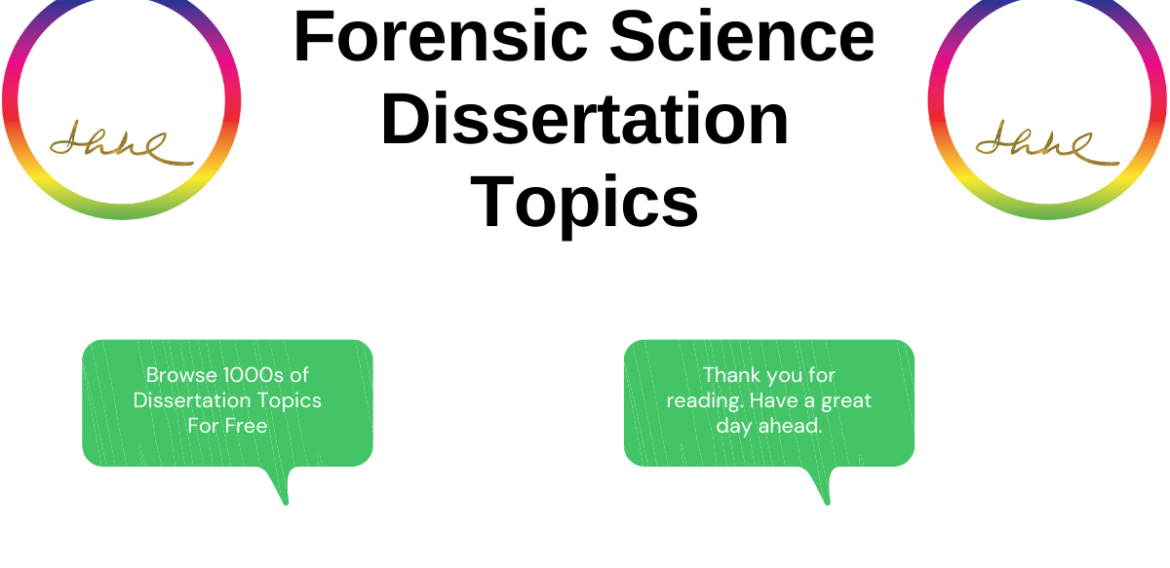Forensic Science Dissertation Topics
Due to the breadth of its subtopics, which include general issues, ethical issues, current and emerging issues, and Brexit, forensic science is an especially fascinating field of study. As a result, both undergraduates and postgraduates view forensic science as an especially advantageous field of study in which to complete their dissertation in order to earn the best grade possible and thus advance their academic and career goals.
Editingarsenal has compiled a list of some of the most popular and common dissertation topics from a variety of academic disciplines, so you can pick and choose what to write about. If you need dissertation editing assistance , don’t hesitate to contact one of our qualified and experienced editors and proofreaders.
General Forensic Science Dissertation Topics
- A reliability assessment of evidence pertaining to arsonists’ clothing that has sustained superficial heat damage.
- Evaluate forensic dentistry’s ability to solve crimes in conjunction with legal ethics.
- Evaluating the efficacy of using gene expression methods to study ageing injuries and estimating injury age.
- Consolidation of police forces in England: Is there consistency in the provision of forensic services throughout the country?
- A comparison of two illicit tablet recognition systems used in the United Kingdom, one based on colour recognition and the other on shape and pattern recognition. Furthermore, assess the utility of combining the two approaches.
- Determine the consistency of forensic techniques used by various police forces in the United Kingdom, as well as the advantages and disadvantages of combining force forensic departments.
- Pollen analysis of the environment is being evaluated as a method for detecting counterfeit cigarettes.
- Determine the efficacy of dry vacuuming in recovering DNA from handwritten documents.
- Examine the possibility of using keystroke biometrics in forensic user profiling.
- The effects of microwave radiation on the digestion of proteins in bodily fluids are being determined.
Ethical Dilemmas in Forensic Science Practice
- Drylabbing, or asserting that laboratory analysis was conducted when none was, has become a source of contention in a number of high-profile cases in recent years. What approach should forensic scientists take when it comes to dry-labbing?
- What effect is the growing use of private forensic consultants having on forensic science? These consultants may not be bound by the same disciplinary codes as traditional forensic scientists.
- Examine the assertion that outsourcing forensic science work to private contractors has resulted in a decline in standards in the United Kingdom.
- To what extent is it unethical for forensic science to use genetic research results to label samples collected at a crime scene as ethnic or racial?
- What ethical concerns exist currently regarding the collection, storage, access to, retention, and sharing of DNA samples?
Brexit Effect On Forensic Science Practice
- To what extent is Brexit likely to jeopardise forensic science’s future viability in the United Kingdom?
- Analyze the impact of Brexit on forensic data exchange with the European Union.
- What effect will Brexit have on other developments that are already reshaping the UK’s capabilities and capacities in forensic science, such as digital and cyber forensic technologies and the use of artificial intelligence in forensic settings?
- Evaluate the effect of the UK’s exclusion from European research programmes on the global influence of UK forensic science and technology institutions.
- Is Brexit an opportunity for the UK forensic science community to strategically strengthen itself by diversifying its professional, institutional, and economic base in areas such as public health and regulatory science?
- Evaluate the viability of a common European ballistics database in light of the UK’s opt-outs in policing and criminal justice.
Technological Advancements and Forensic Science
- How prepared is forensic science for technological advancements and, by extension, crime enabled by technology?
- When it comes to investigating crimes committed on the dark web, how sophisticated is forensic science?
- What benefits does blockchain technology bring to the field of digital forensics?
- Analyze the most frequently used techniques for forensic cryptocurrency investigation in light of internationally recognised legal standards.
- Evaluating forensic science’s effectiveness in analysing how cryptocurrency payment flows are used in a variety of criminal activities.
- Contamination: determine the efficacy of USB devices and remote monitoring software in policing sex offenders’ computer use.
- What forensic issues arise as a result of the Internet of Things (IoT) and its increased vulnerability to cybercrime?
- Investigate the nascent field of Internet of Things (IoT) forensics.
- What applications does Deep Learning, a subset of Artificial Intelligence, have in particular in cyber-forensics?







